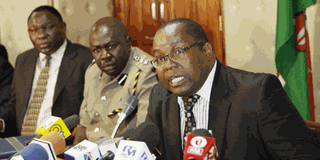Hate mongers put on notice

PHOTO/STEPHEN MUDIARI Mzalendo Kibunjia (right) addresses a press conference in Nairobi, January 9th, 2013.
What you need to know:
- CCK to help track perpetrators of hate messages on the Internet, says police spokesman
Bloggers and social media users who publish hate speech will be arrested and prosecuted in the next two weeks.
Stakeholders such as the Communications Commission of Kenya had made it easier to stem hate speech, deputy police spokesman Charles Owino said on Wednesday.
Mr Owino, who acknowledged that it had been difficult tracking the culprits, said police had already identified two vernacular radio stations which air hate messages.
“It is not going to be business as usual, if you have committed a crime we are going to get you and arrest you. The technical aspects may have posed a challenge but we now have the information to press charges,” he said during a weekly media briefing at the Ministry of Information offices in Nairobi.
Kenyans in diaspora
National Cohesion and Integration Commission chairman Mzalendo Kibunjia said Kenyans in the diaspora formed the bulk of those who used the Internet to spread hate messages.
Dr Kibunjia said action would be taken against hate mongers in the next few weeks.
“They cannot say they do not know about hate speech because it is in the law and we tell them the same when we visit the diaspora,” he said.
Information permanent secretary Bitange Ndemo said they would consider asking for Interpol’s help to track suspects. “We are going to smoke these people out, even those hiding behind pseudonyms through a process known as triangulation,” he said.
The government on Tuesday formed a special team to monitor hate speech ahead of the March 4 General Election.
It includes head of Civil Service Francis Kimemia, Internal Security permanent secretary Mutea Iringo and Dr Ndemo. They will also work with the cohesion commission and the National Steering Committee on Media Monitoring to bring perpetrators to book.
The government’s decision followed complaints by a media monitoring committee that bloggers spread hate messages.
Dr Ndemo said media houses would be held responsible for what appeared on their websites.
He asked editors to guard against divisive posts from the public.
“Since last year, we have been telling ISPs to ensure that they assign a public IP address for every gadget using the Internet. This way we are able to trace and find the criminal, but we cannot do it because of the laziness of systems administrators. We will actually sue the ISPs for the messages,” Dr Ndemo warned.
He also criticised some columnists for discrediting the electoral commission.
“People are trying to invest in this country and some are holding back until after the elections and then we get a distinguished Kenyan to get such a message across to the world to undermine his own country. That is not patriotism,” he said.




